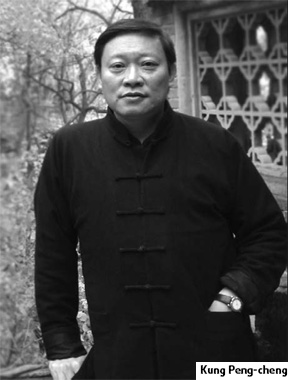Confucianism is more about way of life
The world's interest in China, its history, culture and economy is not new. But it seems to have reached a feverish pitch now that the country is poised to become the world's second largest economy. One indication of that is the opening of an increasing number of schools for Chinese culture both in and outside the country. And though not entirely true, Chinese culture has become synonymous with Confucianism.
That's great news for Kung Peng-cheng, a Taiwan resident and visiting professor at Peking University. Kung has always dreamed of seeing the revival of Confucianism.
In his crimson Tang suit with frog buttons, Kung looks more like a man from the late Qing Dynasty. He seems to have stepped out of an even earlier era when he speaks. He is soft-spoken but articulate, quoting from Chinese classics with graceful lan.
Kung is a Confucius scholar and follower. He has spent nearly three decades writing, teaching and traveling, similar to what the revered philosopher did more than 2,500 years ago. He is only 53 years old but has already authored more than 70 books on subjects ranging from Chinese literature and history to philosophy and religion. Among his celebrated works are The History of Chinese Literary History and Introduction to Chinese Studies. Kung may be happy at the renewed public interest in Confucianism, but he warns against the tendency of using Confucius' teachings just to make money. It is still too early to say we are in the throes of a cultural renaissance. So, he says, we should do more pragmatic things to carry our culture forward rather than indulging in empty talk about when and how Chinese studies would become a dominant subject worldwide.
"Confucianism is first and foremost about education, because education can make everyone a better person," Kung says. Education can help any person to grow into a wise man. For thousands of years, Chinese people have attached great importance to education. And education has played a vital role in making us better students, better employees and better human beings. But today, society is in danger of losing that tradition, because government spending on education (and cultural development) is inadequate.
Even the Yangtze River Delta region, with all its talents and economic power, doesn't have good universities except in big cities such as Nanjing and Shanghai. Kunshan, an industrial city in Jiangsu province and home to about half a million Taiwan businesspeople, does not have a single institution of higher education. Many enterprises don't even try to retain talented people who could lead them toward sustainable growth.
At the national level, education faces a different kind of problem: uneven distribution of resources. The bulk of government fund goes to the 100-odd key universities and colleges. For example, only three universities are designated as key institutions in Hunan, although the province is about the size of Britain. The rest of the universities and a large number of colleges have to struggle for funds. The case is similar in many other provinces and regions, says Kung, who is former president of Taiwan-based Fokuang and Nanhua universities.
Confucius tried to make education accessible to students from all classes. And education has been an equalizing force since then. Kung's personal experience bears testimony to this. He was born in a poor family, removed from science, philosophy and the arts. But thanks to his education he could still read Chinese classics, albeit with the help of his teacher. This transformed him from a teenager good at street fights into a scholar.
The widening income gap, however, has now made it even more difficult for poor children to go in for higher studies and change their fate. The wealth divide is actually insulating the social classes further.
Of course, the government has to raise its spending on education, Kung says. But it should allow more non-public investors to open schools, too. In Taiwan and Hong Kong, many religious organizations run schools. But on the mainland, Kung says, they rarely do so.
 0
0 






